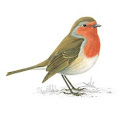This is a post about being funny (or not).
I'm not really a funny person, especially when it comes to making jokes on the fly, especially with large groups of people, and especially people I don't know very well. My jokes in any case tend to be of the punny variety, and I am often too slow on the ball to sneak in something when it's the right moment. Much better at written verbal wit: I'm dorky like that. (By the way, this is not the same thing as not having a sense of humor. I love laughing at other people's funniness. Especially of the punny, ironic, slapstick, and deadpan varieties.)
But things get drastically worse when speaking in another language. Even when I find something funny, and try to explain it, the joke falls flat. Flat as Nebraska. Often, the thing that I find funny has to do with a word that in the other language sounds like (or looks like) something in English that is funny. (*Example: the subject line of this post. I think--according to my limited French--that "hein" is the French equivalent of "heh." And that is funny. It just is.) But this sort of thing is often not very funny for other people, evidently.
So I was immensely, inordinately proud of myself the other night when I made a group of Catalan friends laugh. I was emboldened to explain, in Catalan, why the city name "Antwerp" was funny to me. I told them that it sounds like the English word "twerp," which means, roughly, "un petit gilipollas," or to untranslate what I was mentally translating, "a little idiot." Fortunately, everybody found this quite as amusing as I did, but of course what was funny to them was the translation of the word "twerp," not the fact that Antwerp contains that word, which is what I found funny. Still, it was funny. I was funny!
Another interesting aspect of this question is the different sense of what is funny that happens when I am speaking English, but with a group of non-native English speakers. I can use words to comic effect that I anticipate will be funny to them, even though with native English speakers it would not be funny in the slightest. Here's an example. Last week, when we met our new landlord, who is a Belgian/Iranian doctor, we were speaking English with him and the girl who is living there now. I explained the fact that we're keeping her things for a while by saying, "We are babysitting her furniture for a month or so." While this isn't particularly funny, I knew that for a non-native speaker the juxtaposition of "to babysit" and "furniture" might be surprising. And, indeed, it got a laugh, and in response, our new landlord said that he hoped the furniture didn't "cry too much."
As for French, I think it is going to be a long, long time before I can be funny in that trippy tongue. I had my end-of-semester oral exam today, and I was totally unprepared because in the end the prof just asked me to talk about me! Imagine that. I had prepared to talk about Julie, Benoit and Pascal, the lovable characters in our class language video. Yeah, you know the types.
I think I did OK, muddling my way through an explanation of my studies, my thesis, what I'm doing in Brussels and so on. I'll know Wednesday if I passed (I'm certain I did; no matter how bad my passé composé was, I don't think it merits a failure, and I know the written exam was fine), and next week, the new class starts. Fortunately for me, I wasn't required to be funny.
And in retrospect, I apologize for this post, because is there anything less funny than talking about what is funny? And now I've gone and written the word "funny" so many times that it's starting to take on that weird abstractness words get when you say them over and over and over...
Correction: turns out that "hein" means "eh" more than "heh." My bad.
29 January 2007
Heh, heh, heh; or, hein, hein, hein*
thoughts thunk by
Robin
at around
15:03
![]()
phylum or species: Catalan(s), Language
Subscribe to:
Post Comments (Atom)

1 comment:
This post was pretty funny. Not "ha hah" laugh-out-loud funny, but funny nevertheless. More than a "heh", even. Definitely more than an "eh".
Post a Comment